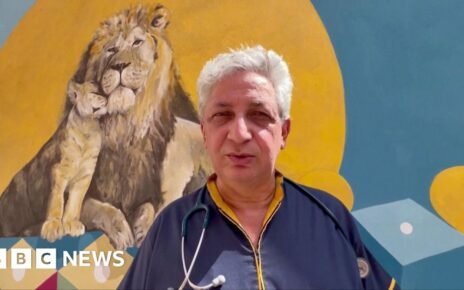[ad_1]
 Reuters
ReutersThe far right could be on the brink of its first election victory in a state known as the bastion of Germany’s social democrats.
Brandenburg, close to Berlin, has been governed by Chancellor Olaf Scholz’s centre-left Social Democratic Party (SPD) ever since German reunification.
But two million voters are heading to the polls on Sunday for a tightly fought regional election that Alternativ für Deutschland (AfD) stands a chance of winning.
It would add to the AfD’s recent election successes – and prove a major embarrassment for Scholz, who lives in the state’s capital, Potsdam.
Such a result, while far from certain, would cast further doubts on Scholz’s ability to lead the party into next year’s federal elections, where he hopes for a second term despite a slump in his approval ratings.
The AfD became the first far-right party to win a state election in Germany since World War Two, in the eastern state of Thuringia, on 1 September and came a narrow second in Saxony on the same day.
The group, officially classified “extremist” in some states, would be unlikely to enter regional government if it were to win in Brandenburg, as every other party has refused to work with it.
Polls close in Brandenburg at 18:00 (1600 GMT) and the first exit polls and preliminary projections will be announced as soon as voting ends.
Symbolic victory – and headache for Scholz
 Getty Images
Getty ImagesThe AfD did not win a majority in Thuringia or Saxony and is unlikely to do so in Brandenburg either.
But it would be a symbolic victory, as the AfD continues to capitalise on worries over an economic slowdown, immigration and the Ukraine war – concerns that resonate strongly in the formerly Communist eastern Germany.
Brandenburg is the SPD’s traditional stronghold – it has won elections in the sparsely populated state since East and West Germany were reunified in 1990.
Its popular SPD premier, Dietmar Woidke, has mostly shunned campaigning with Scholz and is critical of his ruling coalition’s behaviour and policies.
 Reuters
ReutersScholz, meanwhile, called earlier this month on other parties to block the “right-wing extremist” AfD from office by maintaining a so-called firewall against it.
The chancellor, an SPD member and former leader, described the results in Thuringia and Saxony as “bitter” and “worrying”.
Hans-Christoph Berndt, the AfD candidate for Brandenburg state premier, cast his ballot in the town of Golssen, south of Berlin on Sunday and said the party had seen growing support since the last state election in 2019.
Bolstered by youth support, the AfD has been narrowly leading the SPD in the polls – but more than a quarter of voters are estimated to be undecided.
[ad_2]
Source link freeslots dinogame telegram营销




